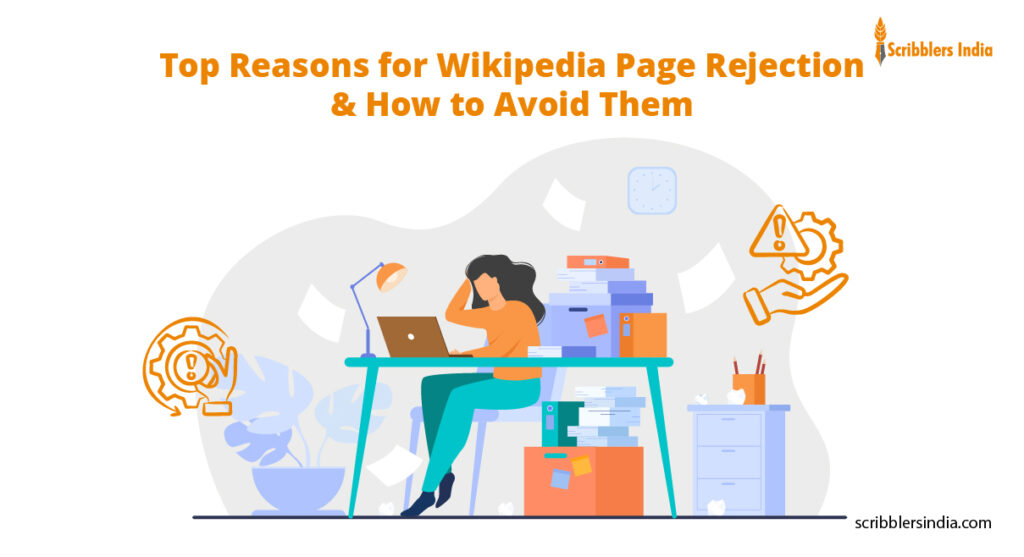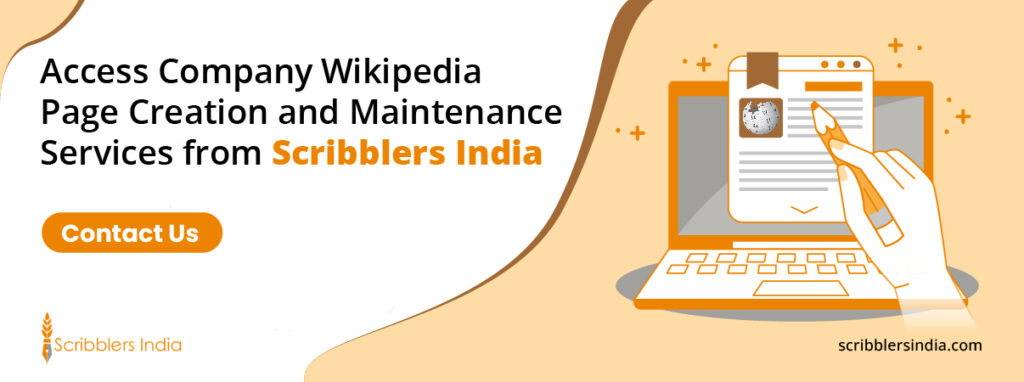You have dedicated hours, perhaps even days, to researching, writing, and perfecting an article for Wikipedia. You confidently click “Publish page,” anticipating the moment your work goes live. Instead, a notification arrives: your submission has been declined or, even more dishearteningly, speedily deleted. Understanding the reasons for Wikipedia page rejection can help you avoid this frustrating experience.
The frustration and confusion are immense, leaving you to wonder what went wrong. This experience is a common rite of passage for many new editors because a Wikipedia page is one of the most trusted digital assets, and the standards for inclusion are rigorously high.
A presence on Wikipedia lends prestige, credibility, and SEO benefits to a brand or individual, which is precisely why it is so sought-after. This guide will provide a clear and actionable roadmap to help you understand the most common reasons for Wikipedia page rejection.
Read on for key strategies needed to navigate the submission process successfully and understand precisely how to avoid Wikipedia page deletion.
Why Is It So Hard to Get a Wikipedia Page Approved?
Getting a Wikipedia page approval is difficult as it is a global encyclopedia, not a marketing platform or business directory. Its volunteer editors strictly enforce a set of core principles known as the “Five Pillars” to maintain its integrity, and your article must meet these standards for acceptance.
You must fundamentally shift your mindset from that of a marketer to that of an encyclopedist. The platform’s entire purpose is to be a neutral, fact-based summary of human knowledge.
A global community of volunteer editors passionately protects this mission and acts as the guardians of the encyclopedia. They do not serve as customer service; they uphold the project’s quality and principles, and they often reject pages when submissions fail to meet those standards.
What is Wikipedia’s main goal?
Wikipedia’s primary mission, outlined in its Five Pillars, is to build an encyclopedia. It is not a soapbox, an advertising platform, or a place for original research. This goal directly contrasts with the natural aim of an enterprise or individual, which is often to promote a personal or business brand, control a narrative, or establish credibility.
Who are the Wikipedia editors who approve or reject pages?
The editors are a diverse, global community of unpaid volunteers. They range from casual contributors to highly experienced administrators with advanced permissions. Their motivation is driven by a passion for accuracy and free knowledge.
These editors use review processes like “New Page Patrol” and “Articles for Creation” (AfC) to vet new submissions against established policies. This means you are not dealing with an algorithm; you must convince a knowledgeable human peer that your contribution has value, and failing to do so is among the top reasons for Wikipedia page rejection.
What Is the Number One Reason My Wikipedia Article Was Rejected?
The single most common reason for the ‘Wikipedia page rejected’ notice is the failure to demonstrate “notability,” which is requires that every topic must pass to merit a standalone article. ou must prove notability through strong, verifiable, third-party sources, otherwise reviewers will reject your page regardless of its quality.
A lack of notability remains the most significant hurdle in creating a page. A 2022 Wikimedia Foundation study showed that reviewers declined a large percentage of drafts in the Articles for Creation process precisely because they did not cite sources that establish the subject’s notability.
This is not just a suggestion; it is the bedrock of inclusion and the most critical of all reasons for Wikipedia page rejection.
What does “notability” actually mean on Wikipedia?
Notability is formally defined by Wikipedia’s General Notability Guideline (GNG). Its core principle is simple but strict: your topic must have received significant coverage in reliable sources that are independent of the subject.
You must satisfy all three of these components. It is not a multiple-choice test. Failing to meet even one of these criteria will lead to rejection. This guideline exists to prevent Wikipedia from becoming an indiscriminate collection of information on every person, company, or garage band that exists.
What counts as “significant coverage”?
This is where many new editors falter. Significant coverage means that sources discuss your topic directly and in substantive detail. It is not enough for your subject to be mentioned in passing. Routine business announcements, event listings, or directory entries do not count.
Think of it this way:
- Significant Coverage: A full-length feature article in Forbes that analyzes your company’s business model and impact on the industry.
- Not Significant Coverage: A syndicated press release about your new product that appears on 50 different “news” websites but originates from your own marketing department. This is just one source, not 50.
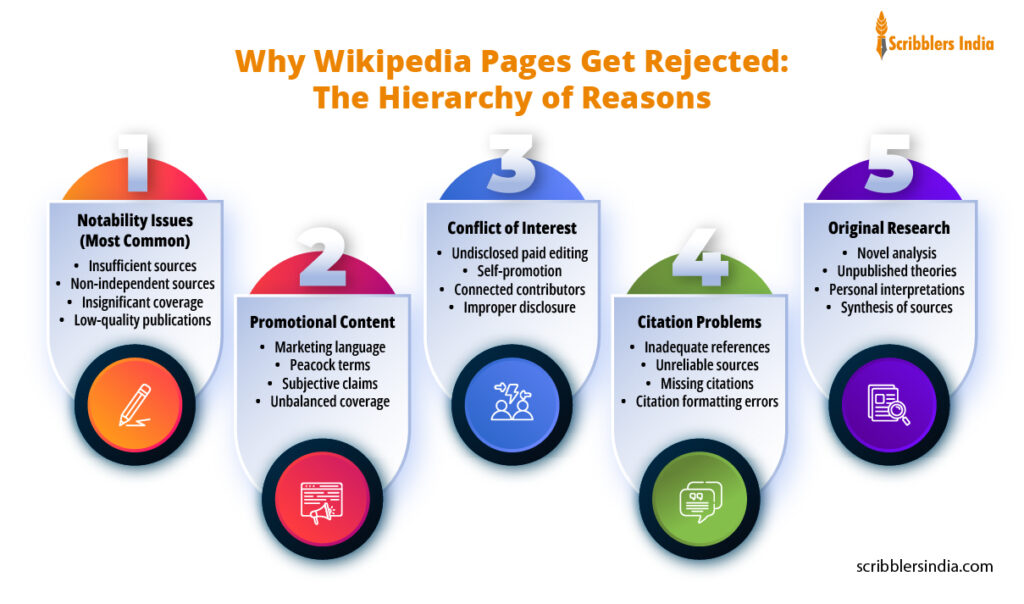
How do I know if my sources are “reliable and independent”?
Understanding what constitutes reliable sources for Wikipedia is arguably the most critical skill for a new editor. These sources must have a reputation for fact-checking and editorial oversight. Independence means the source has no vested interest in the topic. Here is a more detailed breakdown:
- Tier 1: Gold Standard (Highest Quality):
- Peer-reviewed academic journals.
- Books published by major academic presses (e.g., Oxford University Press).
- Articles from globally recognized newspapers of record (e.g., The New York Times, The Wall Street Journal).
- Tier 2: Generally Reliable:
- Articles from reputable national and local newspapers with strong editorial standards.
- Content from established, mainstream magazines (WIRED, The Atlantic, India Today).
- Books from respected commercial publishers.
- Tier 3: Questionable (Use with Caution):
- Trade publications (can be reliable for facts but may have a pro-industry bias).
- Expert blogs (can only be used to attribute an opinion to that specific expert, not to state a fact).
- Tier 4: Unacceptable for Notability:
- Press releases: They are by definition not independent.
- Sponsored Content/Advertorials: This is paid media and is explicitly rejected.
- Your Company Website/Personal Blog: You control the content.
- Social Media, Fan Sites, and Forums: They lack any editorial oversight.
- Interviews: These are primary sources, as the subject is providing the information directly.
Is there a difference between notability for a person versus a company?
Yes. While the General Notability Guideline (GNG) is the ultimate standard, Wikipedia also has Subject-Specific Notability Guidelines (SNGs) that offer more tailored criteria. If a topic meets an SNG, it is presumed notable.
- For Companies and Organizations (NCORP): The guideline looks for evidence of national or international interest. It relies heavily on the GNG, requiring significant coverage in multiple independent, reliable sources. There is no shortcut for businesses.
- For People (NPERSON/BIO): The issue has several nuances. Reviewers may consider a person notable if they meet specific criteria, such as serving as an elected politician, gaining national recognition as an entertainer, competing as a professional athlete in a top-tier league, or making significant academic contributions in their field. However, even under SNGs, reviewers still require strong sourcing.
Failing to meet these specific guidelines means you must fall back on the GNG, making the sourcing challenge even greater. This misunderstanding is one of the many reasons for Wikipedia page rejection.
What Are Other Common Mistakes That Lead to Page Deletion?
Beyond notability, a host of other policy violations are frequent reasons for Wikipedia page rejection. These errors often reveal a fundamental misunderstanding of Wikipedia’s core principles. Even a highly notable topic can have its page deleted if the content is promotional, unsourced, or violates community standards.
A Wikipedia page rejected for these reasons can be even more frustrating because the topic itself may be valid. It signals that the failure was in the execution, not the concept. Let’s explore these critical mistakes in greater detail.
Not Following a Neutral Point of View (NPOV)
Your article must be written from a Neutral Point of View (NPOV), which is one of Wikipedia’s three core content policies and is non-negotiable. This means representing all significant viewpoints fairly, proportionately, and without editorial bias.
Avoid “peacock terms” that praise the subject (“visionary,” “leading,” “acclaimed”) and “weasel words” that create an illusion of significance (“Many people say…,” “It is considered…”).
The content must also adhere to the principle of WP:WEIGHT, giving appropriate space to viewpoints based on their prominence in reliable sources.
- Promotional: “The company is a world-class leader in cutting-edge technology, and its revolutionary software is celebrated by experts.”
- Neutral: “The company develops software. Several industry publications, including TechCrunch and PC Magazine, have reviewed its products. [Source A] described the software’s user interface as ‘intuitive’.”
Conflict of Interest (COI) on Wikipedia
A conflict of interest on Wikipedia exists whenever you have a personal or professional connection to the article’s subject. This includes writing about yourself, your family, your employer, or your clients.
While editing with a COI is not forbidden, editing with an undisclosed paid COI is strictly prohibited. Failure to disclose that you are being paid to edit is a serious breach of the community’s trust and can lead to the deletion of your contributions and your account being blocked.
Not providing citations to prove the claims
Wikipedia operates on the principle of “Verifiability, not truth.” This is a crucial and often misunderstood concept. It means that readers must be able to check that the information comes from a reliable source.
Even if you know for a fact that your company was founded in a garage in 1998, if you cannot find a reliable published source that states this, you cannot include it in the article. Every substantive claim requires an inline citation.
An article with large blocks of uncited text is a prime candidate for deletion and is one of the top reasons for Wikipedia page rejection.
Using own original research
Wikipedia is a tertiary resource, meaning it summarizes information from primary and secondary sources. It cannot be used to publish new information or new ideas. The “No Original Research” (NOR) policy forbids this.
This also includes “synthesis,” which is the act of combining information from multiple sources to reach or imply a conclusion that is not explicitly stated in any of the sources. Your job is to report what the sources say, not to interpret them.
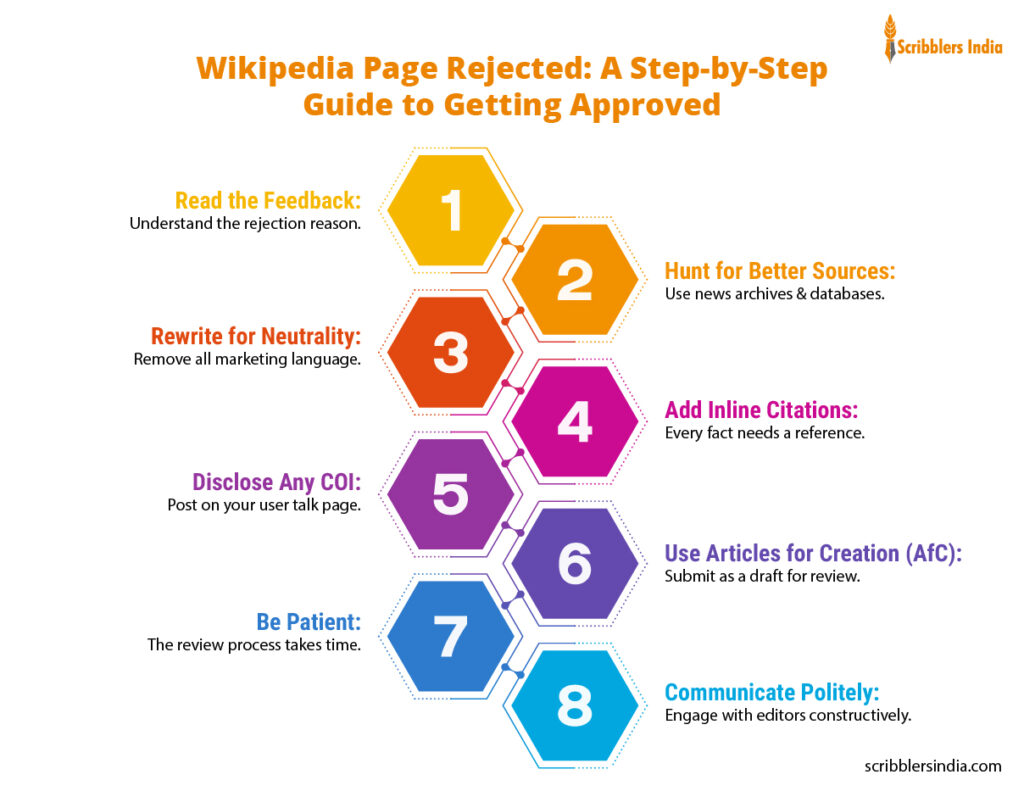
How Can I Fix My Rejected Article and Get It Approved?
Receiving a rejection notice is not a final verdict. It is a form of feedback. You can turn this setback into success by methodically addressing the specific reasons for Wikipedia page rejection you were given. This involves deeper research, meticulous rewriting, and using the correct community processes.
Your goal now is to transform your rejected draft into an article that is undeniably compliant and valuable to the encyclopedia. This is the most effective way to learn how to avoid Wikipedia page deletion in your future endeavors.
Find the right sources to prove notability
Go beyond a simple Google search. Use advanced search operators to narrow your results (e.g., site:.edu “your company name” review or filetype:pdf “your topic” study). Access academic databases like JSTOR, ProQuest, and EBSCO, which are often available for free through local or university libraries.
Look for journalists who cover your industry and search their article archives. This level of research is what separates successful pages from the ones that face rejection.
Rewrite Wikipedia content to be neutral
Strip your draft of all subjective language. A practical exercise is to print the article and physically cross out every adjective and adverb. Then, rewrite the sentences using only nouns and verbs.
This forces you to focus on verifiable facts. Read your sentences aloud. Do they sound like an encyclopedia entry or a marketing brochure? This self-audit can help you eliminate the promotional tone that is one of the leading reasons for Wikipedia page rejection.
Check out our guide on how to create a Wikipedia page successfully to learn more about the process.
Find the best way to submit a Wikipedia article
For any editor who is new or has a conflict of interest on Wikipedia, the only recommended path is the Articles for Creation (AfC) process. This is a dedicated review queue where you submit your article as a draft.
It is a far safer environment than publishing directly, as experienced reviewers will assess your work and provide specific feedback for improvement rather than simply deleting it. They will often point to the exact policies you need to address.
Properly disclose a Conflict of Interest
Transparency is your best tool. To disclose properly:
- Create a user page on Wikipedia.
- Add the {{paid|employer=EmployerName|client=ClientName}} template to your user page.
- When you submit your draft, post a message on its “Talk” page clearly stating your affiliation. For example: Hello, as part of my work with [Your Company], I have prepared this draft about [Subject]. I have a paid conflict of interest and am seeking review from independent editors. [Your signature]
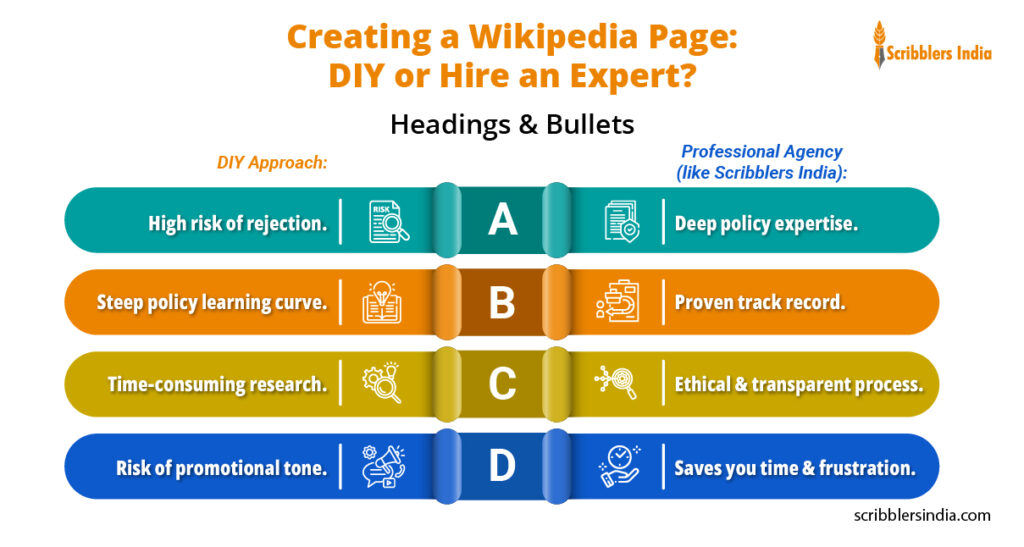
Why Should I Hire a Wikipedia Page Creation Agency?
The journey to a successful Wikipedia page is a high-stakes endeavor, filled with complex policies, strict community standards, and a steep learning curve. After understanding the hurdles, many realize that a DIY approach can lead to wasted time, brand reputation risk, and a frustrating cycle of rejection.
This is where professional Wikipedia page creation expert becomes an invaluable strategic partner. An expert agency already knows the landscape. They understand the nuanced ecosystem of Wikipedia, from its technical rules to its unwritten community etiquette.
They can save you time, manage the entire process, and dramatically increase your chances of success, turning a stressful task into a straightforward project and helping you avoid the common reasons for Wikipedia page rejection.
What do Wikipedia experts know that I don’t?
Experts have a deep, practical understanding of policies like the Wikipedia notability guidelines. They don’t just know the rules; they know how the editor community interprets and applies them.
They possess advanced research skills to unearth qualifying sources you might miss and are masters at writing in the dry, dispassionate, and encyclopedic tone fundamental to acceptance.
Is it ethical to pay someone to write a Wikipedia article?
Yes, it is entirely ethical and fully compliant with Wikipedia’s rules, on one critical condition: 100% transparency. Wikipedia’s Terms of Use explicitly require anyone receiving compensation for their contributions to disclose who is paying them.
At Scribblers India, we strictly adhere to these mandatory Paid Contribution Disclosure guidelines. This ensures an ethical process and builds pages that last.
Why is Scribblers India the Best Wikipedia Creation Agency in India?
Choosing a Wikipedia page creation agency is about finding a partner who understands both the global rules of Wikipedia and your specific context. We offer a distinct and decisive advantage.
- Deep Understanding of the Global Media Landscape: Our team possesses an unparalleled understanding of international media ecosystems. We recognise which publications the Wikipedia community regards as reliable and which it dismisses as promotional, enabling us to build the strongest possible notability case for you.
- A Proven Track Record of Success: We have successfully published and sustained pages for a diverse range of clients, from high-growth startups and established corporations to artists and entrepreneurs. Our experience is your assurance against the many reasons for Wikipedia page rejection.
- Unwavering Commitment to Ethical Guidelines: We build pages that last. Our process focuses on ethical best practices. We strictly adhere to all of Wikipedia’s policies, ensuring our work stands up to the scrutiny of the editor community.
- End-to-End Strategic Service: We are more than writers; we are strategists. Our service begins with a rigorous, honest notability assessment. From there, we manage the entire process: in-depth research, neutral drafting, submission through the proper channels, and monitoring the page after publication.
Don’t let a frustrating rejection notice decide your online legacy. Navigating Wikipedia’s complex maze requires a guide who knows the territory. As a leading Wikipedia creation agency, Scribblers India has the global expertise to tell your story the right way—neutrally, ethically, and effectively.
Stop battling the common reasons for Wikipedia page rejection. Contact our team today for a free, no-obligation notability assessment and let us build the credible, lasting Wikipedia presence you deserve.
Final Thoughts on Wikipedia Page Rejection
Writing a Wikipedia page demands patience, diligence, and a profound respect for the encyclopedia’s mission. The primary reasons reviewers reject Wikipedia pages are a lack of notability, a promotional tone, improper sourcing, and undisclosed conflicts of interest, are issues you can entirely avoid with the right knowledge and approach
By internalizing these core principles, you can significantly improve your chances of success. Whether you choose to undertake this challenge yourself or work with experts like us who specialize in Wikipedia page creation services, a compliant, well-sourced, and neutral article is the only key to securing a lasting place in the world’s largest encyclopedia.
Frequently Asked Questions on Wikipedia Page Rejection
How long does it take for a Wikipedia page approval?
If submitted through the Articles for Creation (AfC) process, it can take anywhere from a few weeks to several months, depending on the backlog of submissions and the complexity of your article. Direct publication by an experienced editor can be much faster, but is also subject to immediate scrutiny and potential deletion.
Can I write a Wikipedia page about myself?
You can do it, but experts strongly discourage it. Writers treat it as a fundamental Conflict of Interest (COI), and maintaining the required Neutral Point of View (NPOV) becomes nearly impossible. Reviewers scrutinise articles written by their subjects heavily and often delete them for sounding promotional.
If my Wikipedia page undergoes deletion, is it gone forever?
Not necessarily. You can contest the deletion if you believe it was a mistake. More importantly, you can work on addressing the reasons for deletion (e.g., by finding better sources to prove notability) and then resubmit the article through the AfC process. However, repeatedly submitting a non-notable topic can result in ‘salting’ of the subject, preventing its creation.
Do press releases or interviews count as reliable sources?
No. Press releases are not independent, as they are written and are under the control of the subject. Interviews are primary sources, meaning they are “too close” to the subject. Wikipedia requires secondary sources—those written by third parties who have analyzed or reported on the topic.
Is having a popular website and social media presence enough to be notable for Wikipedia?
Almost never. Website traffic and social media followers are not proof of notability by Wikipedia’s standards. Establish notability through significant coverage in independent, reliable sources like major newspapers, magazines, academic journals, or books.
How many sources do I need for a Wikipedia page?
There is no magic number. Quality trumps quantity. Three high-quality, independent sources that offer significant coverage are far better than ten sources that only mention the topic briefly. The key is the depth and reliability of the coverage.
What if I disagree with an editor’s Wikipedia page rejection?
You can open a polite discussion on the editor’s user talk page or the article’s talk page. Calmly ask for specific feedback and state your case with evidence based on Wikipedia’s policies, not just your personal opinion.

